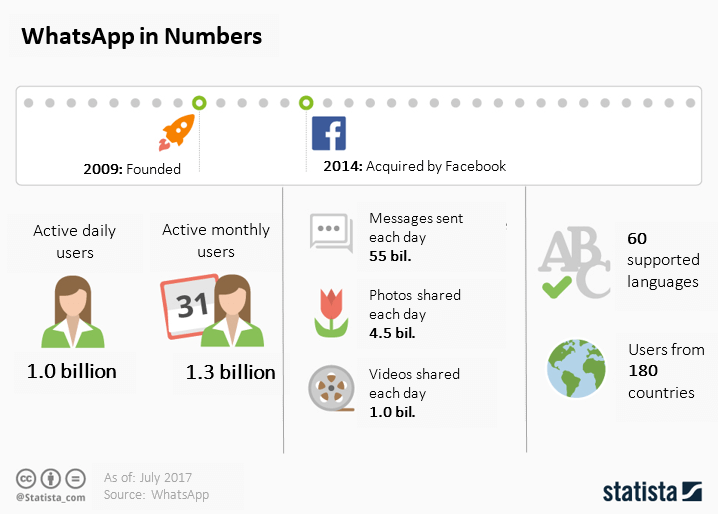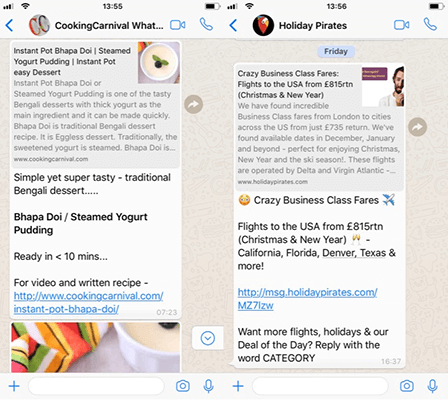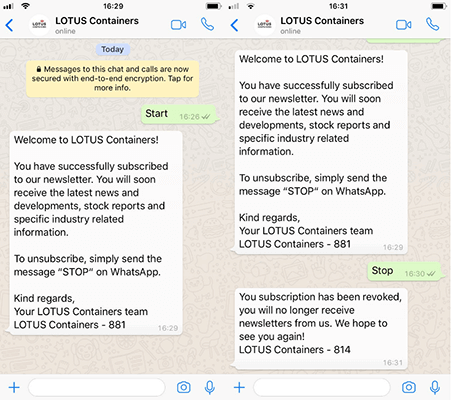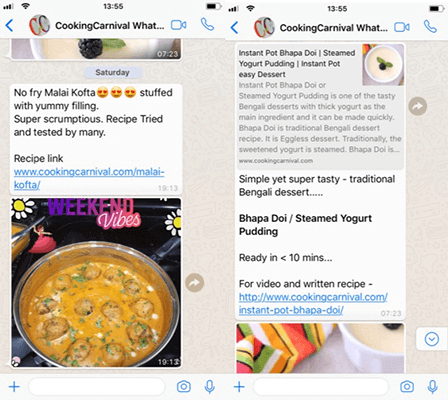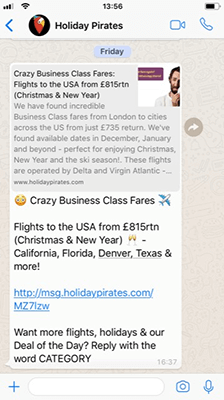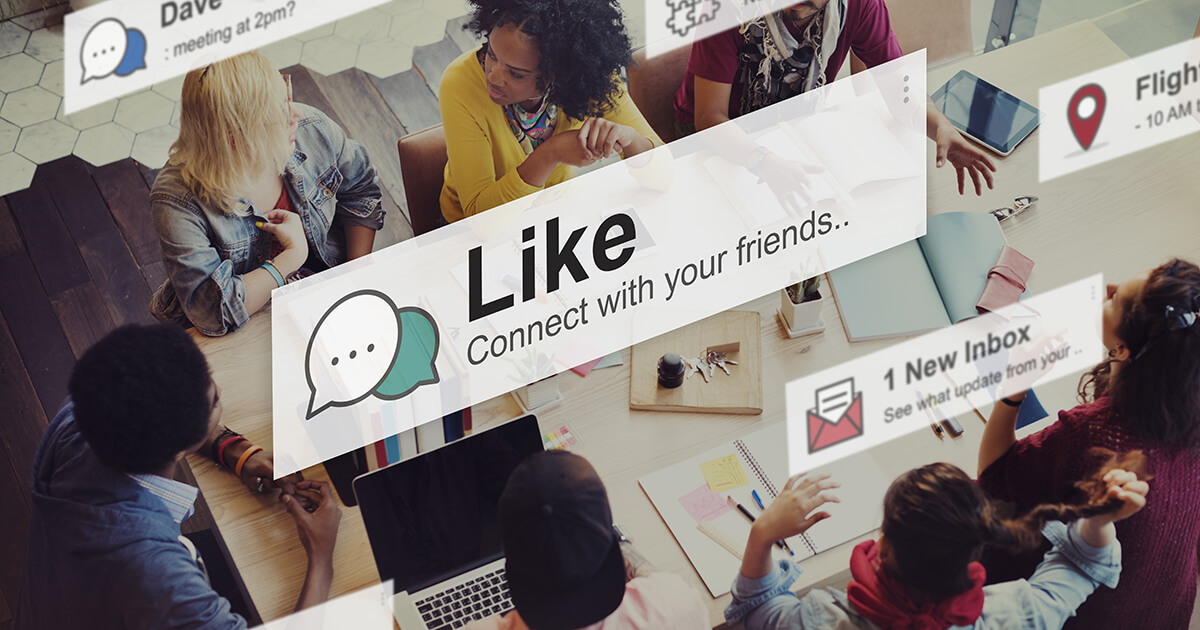WhatsApp marketing: how to set it up for your company
Each month, there are around 1.5 billion active users on WhatsApp – and millions of them are in the UK. Around 65 billion text messages are sent via the messenger service every single day. Image content is also pretty popular: 4.5 billion photos and 1 billion videos are shared between users daily.
- An app on course for success
- Why use WhatsApp for marketing?
- Preparation: invite customers to interact
- How does WhatsApp marketing work?
- Observe the legal limitations
- How registering for a WhatsApp newsletter works
- Support using subscription services
- Creativity is sought after
- WhatsApp marketing: examples
- New possibilities with WhatsApp Business
- Looking to the future: WhatApp for Enterprises and Status Ads
- Alternatives: Business on Messenger and SMS marketing
- Summary: new marketing channel with a future
The messenger app, which is used in 180 countries and supports 60 languages, offers companies a lot of potential for communicating with their customers. The one flaw: WhatsApp is not designed for advertisement in any form whatsoever. Founder Jan Koum followed the mantra: “No Ads! No Games! No Gimmicks!” The messenger is meant to focus on the essentials: communication between people.
The general terms and conditions of WhatsApp prohibit companies from using the app commercially. This can be avoided only if the customer makes contact first. For this to happen, their interest has to be piqued to include the company’s number in their contact list and write to it via the messenger. The contact exchange then counts as communication under the WhatsApp guidelines.
Companies that are already using WhatsApp advertising for their company communication are considered a “social media first mover.” But it hasn’t been tried or tested much yet, and has been even less professionalised. WhatsApp Business, however, is a special app for companies that is already available. It helps simplify communication with customers, separates private from customer contacts and helps you make an official company presence. In some countries, the business app has been available since mid-January 2018. It will continue to be released worldwide, step by step.
An app on course for success
Few people think about this as they write their daily texts to friends, family, and colleagues, but WhatsApp was and is the trigger of a worldwide communication revolution. Founded at the start of 2009 by the former Yahoo! employees Jan Koum and Brian Acton, the messenger app developed within a couple of years into the communication tool of choice for smartphones. 500 million users were already registered when WhatsApp was acquired by Facebook in 2014 for $19 billion (£15 billion) – the second largest acquisition in history.
The story of the app began rather modestly. In 2009, the founder, Koum, saw possibilities for a promising business model in the still-young Apple App Store. His idea encompassed not only the sending of short messages, but also user status messages. He was of the belief that it’s practical to know what individual contacts are up to.
The development progressed rather slowly at first. Frequent app crashes and problems with the synchronisation of phone numbers almost convinced Koum to throw in the towel. But Acton persisted. At that same time and by coincidence, Apple involuntarily gave the app the boost that it needed: Starting in June 2009, it was possible for app developers to use push notifications. WhatsApp users could then see right away when somebody changed their status.
The app eventually developed into an instant messaging service. It also played into the company’s hands that they had almost no competition. Next to Skype, there was no noteworthy competition except for Blackberry Messenger, which only functioned on Blackberry smartphones. With WhatsApp, on the other hand, one could not only reach people via text message at any time and from anywhere in the world, but could also send photos or voicemails.
For a long time, it’s not only been young people using WhatsApp. The ease of use that Koum aspired to has made the messenger service as attractive to all age groups as the developer had hoped. So it seems the actual goal was achieved: To develop an app that even people who didn’t grow up with computers or are unfamiliar with technology can use.
Why use WhatsApp for marketing?
With over one billion daily users, the messenger app offers companies a unique chance to make their customer communication more personal. It should focus less on advertising, and more on consulting. The majority of WhatsApp users are looking for individual and direct contact.
What they don’t usually imagine is the WhatsApp newsletter, which functions as a replacement for the classic e-mail newsletter. Customers prefer uncomplicated customer service and consulting from the company via WhatsApp. Marketers also see great potential in using the app for community management and personal marketing. In this way, WhatsApp offers new possibilities for company communication – and not only externally. The app is also a suitable alternative to team messengers such as Slack, Twist, and others.
Companies should focus primarily on exclusivity and authenticity when using WhatsApp. The goals are long-term customer loyalty and more sales. And the chances for this aren’t bad: Those who trust companies with their phone number over WhatsApp are usually happy with the product or service and also trust the company in general. Whether the investment is really worth if for companies is hard to say, though. WhatsApp marketing hasn’t yet been tested enough, and the ways of measuring it are still too immature. But companies can get more attention for their offer using the first mover advantage. Since the app is mainly used on smartphones (and the browser application also requires a phone number), WhatsApp marketing is the most useful for mobile target groups.
Preparation: invite customers to interact
Before getting started, companies should develop a strategy for how they want to use WhatsApp to market their products or services. As opposed to other social media channels, speed and engagement aren’t sufficient with WhatsApp. What really counts here is relevance and a feel for the correct tone. WhatsApp advertising should offer customers consistent value to draw them in and encourage interaction.
Before setting the WhatsApp wheel in motion, companies first need to get users to sign up for their service or newsletter. Some exciting incentives could include:
- Exclusive content
- Free giveaways as a thank you for signing up
- White papers
- E-books
- Product samples
- Competitions
- Gift cards
- Discounts
How does WhatsApp marketing work?
Once the strategy is set, the implementation can begin. Things that go on in everyday life can become time-consuming with marketing for a company using WhatsApp. The large number of recipients has to be managed well. This can be done using broadcast lists in Android or iOS.
Broadcasting with WhatsApp web
Longer messages can be sent more easily using the WhatsApp web service on the PC. WhatsApp Web runs on all popular browsers such as Safari, Firefox, and Chrome. But the web version only functions if the app is also installed on your smartphone. After an initial login, WhatsApp synchronises all messages. Users can read and write messages from all end devices. But recipients can only be added or removed from broadcast lists using the smartphone app. The number of participants is limited to 256.
Observe the legal limitations
WhatsApp’s terms and conditions present a legal uncertainty for companies, because there are no concrete regulations governing the use of messaging services commercially. It was previously unknown, however, that WhatsApp would have punished a company for using the app for customer communications. Instead, the desire for companies to use the messaging service as a marketing channel has been increasingly pursued by the time and energy invested in the development of WhatsApp Business. Whether it’s possible to efficiently use this WhatsApp variant for advertising, though, is still questionable.
In any case, companies that want to use WhatsApp for marketing need to pay attention to telecommunication and online privacy laws. Sending advertising messages requires the consent of the recipient, so marketing with WhatsApp uses the double opt-in procedure. To register for a WhatsApp newsletter, you’ll be asked to explicitly confirm your subscription. This can be done, for example, using a pre-defined word such as “Start.”
Using WhatsApp to contact customers without their consent is unadvisable, especially because of the new General Data Protection Regulations (GDPR) that came into effect in May. The law states that companies who want to engage in WhatsApp marketing have a duty to provide information and a duty to document. According to this, the company must not only inform its customers when personal data is being processed, but must also carefully document these processing steps.
A data protection problem that WhatsApp was already dealing with before the GDPR came into effect was the automatic synchronisation of all contact data. This is because using WhatsApp requires access to the user’s address book and contact numbers that are not registered with WhatsApp may also be forwarded to WhatsApp. As a result, any company looking to engage in WhatsApp marketing should be sure to only store the phone numbers belonging to customers who have directly contacted them through WhatsApp or who have given their consent in advance.
How registering for a WhatsApp newsletter works
If the customer is convinced, then they just have to register with the double opt-in. This is a small hurdle that every company who uses WhatsApp marketing has to face.
- As a provider, first select a mobile device and a phone number via which you’d like to send the WhatsApp messages
- The customer obtains that phone number from your website (first opt-in)
- Then they add you as a contact in their phone book
- The customer writes the company a message with the word “Start” to activate the WhatsApp newsletter (second opt-in)
- The newsletter can be disabled with the word “Stop”
Support using subscription services
WhatsApp advertising becomes more professional with the use of broadcast services such as WhatsBroadcast, instantKOM, or WhatsATool. These allow you to send messages quickly and easily through a browser. You don’t need a separate phone number. Instead, just integrate the service into your website using a widget, for example. The messages can be supplemented with images, videos, graphics, or links, and then sent with one click to all of your recipients. How well this WhatsApp marketing is received by customers can be tracked with hourly statistics.
Depending on the chosen price category, the company can also offer additional functions such as interfaces (e.g. to Facebook Messenger), URL shorteners, or an increased dispatch speed. You can usually test these services first.
Creativity is sought after
Creating added value and attracting attention are key when it comes to marketing with WhatsApp. How to do this, though, is still mostly up to experimentation. At this point there are only a few best practices for the channel. What works also depends on the target group and the product.
Use a step-by-step method to determine what will be successful for a company on WhatsApp. At the beginning of a WhatsApp marketing campaign, the following factors should be tested:
- Length of the WhatsApp message
- Send frequency
- Send time
- Number and placement of emojis
- Attachment of media such as images and videos
The human mind processes images around 60,000 times faster than text – a good argument for why you should work with numerous emojis. If set up appropriately, subscribers to newsletters will receive the message better and will also be more concerned with its content. The combination of image or video and text also draws more attention.
WhatsApp marketing: examples
Though it hasn’t fully caught on yet in the UK, there are already some examples of marketing campaigns over WhatsApp. We’ve gathered together a couple of examples here.
CookingCarnival
This successful cooking blog operates under the motto “Spice up your life!” and has grown into an absolute treasure trove of healthy recipes to make at home. In addition to a fully equipped blog and recipe index, CookingCarnival offers a WhatsApp newsletter to help inspire readers with new recipe ideas. Subscribers receive messages with links to healthy, vegetarian recipes every few days.
Holiday Pirates
The travel deal site Holiday Pirates uses WhatsApp to share the best bargains and travel deals with subscribers. The newsletter can be tailored based on your location and specialized according to your preferred category. Their WhatsApp campaign operates with the goal of generating more sales of the deals offered on their website.
New possibilities with WhatsApp Business
WhatsApp announced plans for its business app already in summer 2017. At the beginning of 2018, WhatsApp Business officially launched. The new version, which is intended primarily for small businesses and currently only runs on Android, is now gradually being introduced worldwide. WhatsApp is designed to enable companies to create an official presence, separate customer messages from private messages, and make quick communication in general easier. At the same time, nothing is meant to change for users. Unwanted company numbers are still able to be blocked.
A company profile on WhatsApp Business exceeds the range of a normal WhatsApp profile: it can appear with a company description, contact information (e-mail addresses, telephone numbers, websites), and opening hours, therefore fulfilling their legal obligations. The problem with automatic data synchronisation is still present, however. This means that even when using WhatsApp Business, companies may only store the numbers of customers who have given their consent or initiated contact themselves.
You can save quick replies for messages frequently sent to customers, as well as set up absence messages. All contacts and chats can be labelled to help keep track of them.
WhatsApp marketing is especially interesting because the app delivers statistics on sent messages. This lets you trace how many messages were transmitted, and how many of these were read.
Looking to the future: WhatApp for Enterprises and Status Ads
For some time now, companies have been able to sign up for the WhatsApp Business API. This works independently of the Business API and is aimed at medium-sized and large enterprises in particular. Since the interface is still in the test phase, access has so far been restricted. However, it’s fair to assume that the API will be activated for all interested companies in the near future as part of the already announced WhatsApp for Enterprises service. The WhatsApp Business API and the future enterprise service will take enterprise communications over WhatsApp to the next level with features like the following:
- Customer Support: Connections to CRM tools like SalesForce or FreshDesk, including live chat solutions like ZenDesk
- Transactions: The ability to make purchases or bookings through WhatsApp and send corresponding invoices through integration with internal APIs.
- Online payments: Processing online payments by dynamically generated payment links
- Shipment tracking: automatic updates on the delivery status of shipped goods through WhatsApp
- Notifications: Real-time notifications of upcoming events, tasks etc. based on the “if-then” function
- Bots and automated processes: Automate time-consuming tasks like collecting feedback or transferring leads to Excel spreadsheets.
There are already plans for paid advertisement placing to be made available in early 2019, similar to Instagram stories. While it was always in the founders interests not to advertise on WhatsApp, this is the first significant step towards monetizing the Messenger app five years after it’s acquisition by Facebook. However, at least at the start, users should be able to choose whether they want to receive advertising or not.
Alternatives: Business on Messenger and SMS marketing
Competition for WhatsApp comes from within its own house. Since 2016, Facebook has featured Business on Messenger, which basically covers the same scenarios as WhatsApp Business.
Another alternative is SMS marketing. In principle, this functions the same way as e-mail marketing: With minimal effort and comparatively low costs, messages can be sent to a large circle of recipients. But subscribers are responsible for paying the SMS costs required for interaction.
Summary: new marketing channel with a future
For many WhatsApp users, the messenger service has become an important part of their life. This makes it all the more valuable as a location for your service. Communication via private channels allows a particularly close relationship between customers and companies. To what extent WhatsApp marketing will pay off for companies isn’t clear yet. There are still too few meaningful ways of measuring it, and too few case studies on the topic.
WhatsApp Business and the WhatsApp Business API, both of which are currently available, were released in January 2018. In its functionality, it’s specially tailored for companies. In the coming years, the messenger’s monetisation will finally be realised with the launch of the planned advertising strategy, whereby advertisements will be shown on status messages, and the WhatsApp for Enterprise service. It will be exciting to see to what extent these companies can benefit from WhatsApp advertising.

